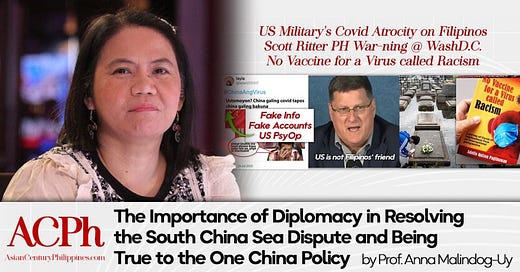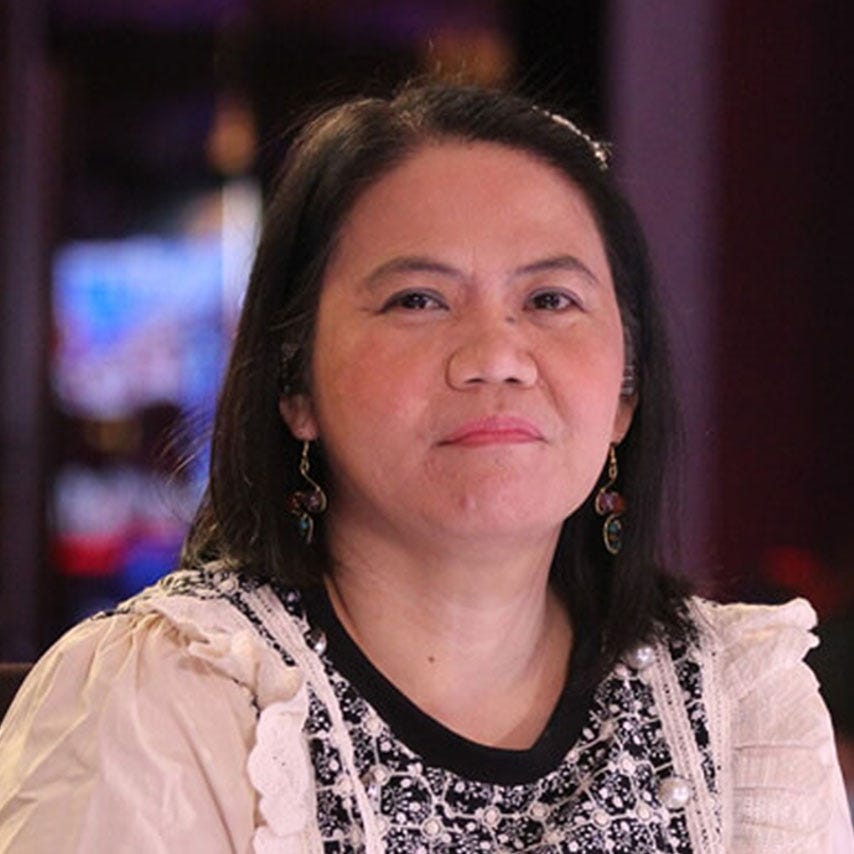The Importance of Diplomacy in Resolving the South China Sea Dispute and Being True to the One China Policy
Friends and colleagues! Ladies and Gentlemen, Good morning!
Thank you for allowing me to speak in this media forum this morning about a topic of utmost importance to our collective future as a country and a people.
The critical issue of the South China Sea dispute between China and the Philippines and the broader implications of the Taiwan Strait situation are not mere geopolitical puzzles; they touch the lives, futures, and well-being of Filipinos and the Chinese people.
The South China Sea is fraught with complexities, competing claims, and strategic interests. This area is a strategic concern for the Philippines and vital to its economic future. However, the path to resolving this dispute does not lie in conflict, confrontation, or antagonism but in peaceful diplomacy and sincere dialogue.
Diplomacy is the art of building bridges, finding common ground, and forging paths to peace and cooperation. The Philippines and China must engage in sincere, respectful, and constructive dialogue and negotiation over the South China Sea dispute. This dispute cannot and should not be resolved through force, intimidation, or confrontation but through mutual understanding and respect between the two sides.
China is not our enemy but our neighbor and friend, and I recognize that we have a dispute over the South China Sea. Geography has placed our nations side by side, and history has shown that cooperation and mutual respect yield far better outcomes than conflict and mistrust between neighbors. By engaging China diplomatically, the Philippines can secure a future where both nations thrive, their peoples prosper, and peace prevails in the South China Sea.
On the other hand, the Philippines must understand the delicate nature of the Taiwan Strait Issue. The Taiwan question is deeply internal to China and a core concern of Chinese sovereignty. Interference in this matter would strain relations and risk dragging the Philippines into a conflict that serves no national interest.
Note that the core principle of non-interference in the internal affairs of other nations is a cornerstone of peaceful international relations. For the Philippines, this means respecting China’s sovereignty over Taiwan and focusing on strengthening bilateral ties through peaceful means.
Reflecting on the broader historical context, it is evident that relying on external powers to dictate national policy can lead to disastrous consequences. The United States, despite its formidable power, cannot sustain a prolonged conflict with a peer-level force like China without catastrophic results. The recent experiences of countries like Ukraine serve as stark reminders of the dangers of being drawn into great power rivalry, competition, and conflicts.
Friends do not let friends suffer immense loss and devastation. True friendship is built on mutual trust, respect, care, and support. The Ukrainian experience shows us what happens when nations are used as pawns in larger geopolitical games—cities destroyed, families separated and lives shattered. I hope Filipinos won’t allow our country to be used as a pawn or proxy of the United States in its strategic competition and rivalry with China, for it will lead to our destruction as a people, as a country, and as a nation. We should have a strong resolve as a people that we will not allow the Philippines to end up as the Ukraine of Asia.
A Call to Action for the Filipino People
Indeed, the time has come for the Filipino people to control their destiny. This means pressing our government to engage in responsible, sincere, and proactive diplomacy with China. It means rejecting the role of a pawn or a proxy in others’ strategic games and standing firm as an independent, sovereign nation that values peace, security, and stability above all.
Diplomacy is not a sign of weakness but a testament of strength, wisdom, and maturity. By choosing the path of diplomacy, the Philippines can avoid the tragic fate of being caught in a devastating conflict. Instead, it can build a future where it is a respected and prosperous nation in the region.
We need to grow up as a country and as a people. Growing up means taking responsibility for one’s future and making hard choices that ensure long-term peace, security, and prosperity. The Philippines has the opportunity to lead by example, showing the world that diplomacy and dialogue can triumph over conflict, confrontation, and aggression even in a complex geopolitical landscape.
Pentagon Clandestine Operations
On the other hand, after closely analyzing the report on the U.S. covert campaign against China’s vaccines in the Philippines during the COVID-19 pandemic, it is evident that the U.S. engaged in significant geopolitical and military maneuvers and manipulations that adversely impacted public health. This secret campaign not only undermined trust in Chinese vaccines but also left many Filipinos and other nationals vulnerable when Western vaccines were not yet widely available. The manipulation led to avoidable suffering and loss of lives, as people were dissuaded from taking potentially life-saving Chinese vaccines amid a global health crisis, a pandemic at that.
Indeed, the U.S. secret campaign against China’s vaccines in the Philippines exemplifies how health diplomacy can be utilized as a strategic tool in military and geopolitical operations and manipulations. This underscores the importance of transparency and ethics in public health communication, especially during a global crisis or pandemic. This report warrants careful consideration by the Philippine government and the international community. This is no joke at all!
No doubt, the Pentagon’s actions were irresponsible and dangerous. Discrediting vaccines based on geopolitical motives rather than scientific evidence undermines the collective effort needed to combat a pandemic. It distracts from the primary goal of saving lives and controlling the virus.
Indeed, misinformation as a geopolitical tool raises serious ethical and moral questions. In the context of a global health crisis, prioritizing geopolitical gain over human lives is profoundly irresponsible on the part of the United States, particularly the Pentagon. This is indeed a manifestation of the US fixation on preserving its global hegemony in an emerging multipolar world. Note that, time and again, the U.S. has historically and contemporarily pursued policies to maintain its global hegemony. More often than not, this focus on strategic dominance leads to actions prioritizing national interests over global public interests. While protecting national interests is a legitimate concern, it should not come at the expense of global public health and cooperation in combatting pandemics, especially in times of global health crisis.
No doubt, the Pentagon’s actions not only compromised the health and safety of Filipinos but also set a dangerous precedent for future global health crises and international cooperation. Such tactics undermine the principles of transparency and cooperation essential for addressing global challenges. In this regard, the current Philippine government, under President Ferdinand Marcos Jr., and the international community must do something to make the doers of this deplorable act accountable and responsible. Such a mistake needs to be rectified and reckoned with.
Conclusion:
To conclude, the Pentagon’s clandestine operations to undermine Chinese vaccines in the Philippines had dire consequences for public health, ethical standards, and international cooperation in the context of a global health crisis. By spreading misinformation and disinformation, the U.S. compromised the well-being of Filipinos, prolonged the pandemic, and damaged its own credibility. This episode is a stark reminder of the dangers of prioritizing geopolitical interests over human lives and the importance of maintaining ethical integrity in global health diplomacy.
On the other hand, let us embrace the power of diplomacy to resolve the South China Sea dispute and avoid entanglement in the Taiwan Strait issue. Let us honor the spirit of friendship and cooperation, building a future where the Philippines and China coexist peacefully and prosperously in Asia.
Ladies and gentlemen. Thank you, and have a Good day!
Prof. Anna Malindog-Uy’s Opening Statement for “US Military’s Covid Atrocity on Filipinos” Forum
Prof. Anna Rosario Malindog-Uy
is a PhD economics candidate at the Institute of South-South Cooperation and Development in China’s Peking University. She is analyst, director and vice president for external affairs of the Asian Century Philippines Strategic Studies Institute (ACPSSI), a Manila-based think tank.
Email: contact@asiancenturyph.com
Facebook: https://www.facebook.com/asiancenturyph/
Twitter: https://twitter.com/AsianCenturyPH





